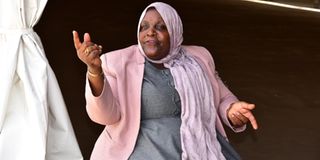Commission demands more women in top posts

EOC chairperson Safia Nalule Juuko. Photo / File
The Equal Opportunity Commission (EOC) has demanded an increase in the number of women holding top positions .
The commission is responsible for affirmative action and equity in order to eliminate marginalisation and discrimination among vulnerable groups.
The EOC officials made the call during the release of a report yesterday dubbed: “Promoting women and girls empowerment through information access.”
The report revealed that 27 percent of women hold top positions as a result of lack of access to information about their respective institutions at universities.
The one-month survey was conducted in Makerere University, Kyambogo University, Kampala International University, Islamic University in Uganda, and Uganda Christian University.
A total of 150 students (51 percent female and 49 percent male) participated.
Eighty percent of the students were aged between 20 and 30 years, while 12 percent were 31 years and above.
The report stated that culture and social expectations are the major barriers to access to information and opportunities.
Gaps
“Lack of mentorship opportunities and parent involvement creates a gap for networking, students lack support to guide them on how they can get started and have a successful journey to victory,” the report reads in part.
Ms Safia Nalule Juuko, the chairperson of EOC, the said the research aimed at assessing the level of awareness and access to information and basic needs of the university students.
“We wanted to determine the primary sources of information and the most effective communication channels and challenges in accessing information by university girls, boys, and women,” she said.
Ms Nalule added that the research focused on the availability of structure gaps in information access among universities, especially for women and girls. She said there are also few women who hold top positions in the public and private sector .
Ms Josephine Apajo, who led the survey, called for a study on the cost of failure to access information by university girls, and another on viability of university parents associations so as to implement affirmative action and enhance girls’ participation.
Ms Apajo added that universities need easy access to sexual and reproductive health services, and utilities like daycare centres.
“There is need for mindset change and training programmes for female students to access, participate and benefit from available opportunities,” she said.




